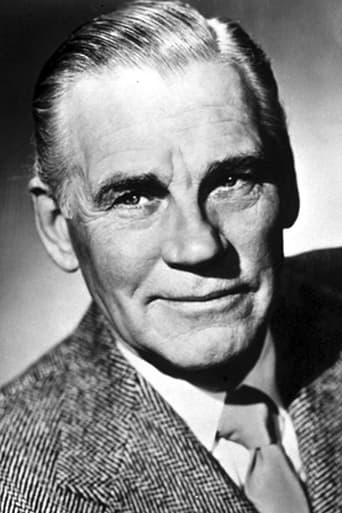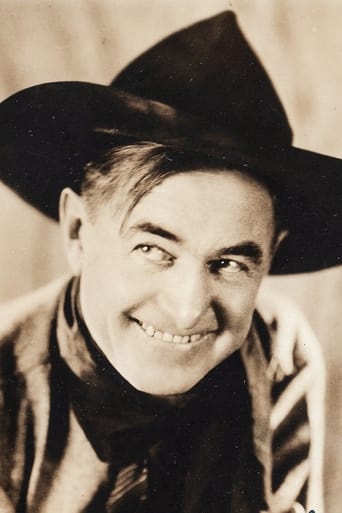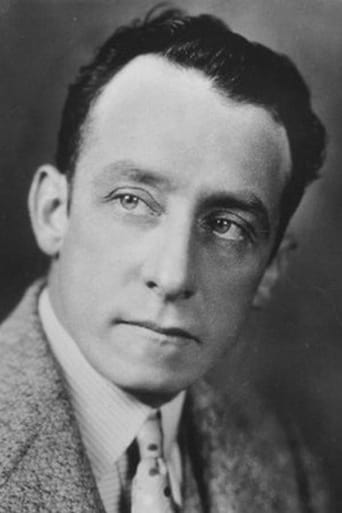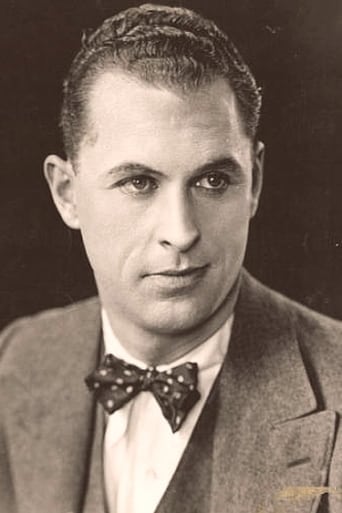calvinnme
First, why is "Frame Johson" not called out by name as Wyatt Earp? This is a fictionalized account of what went on in Tombstone, but close enough that everybody knows THAT is who Walter Huston is playing. Earp had only died in 1929. Did he or his widow have some objection to his name being used in films? Also, whether they fit in the storyline or not, and they usually don't, there is almost always some romance involved in Westerns, but not here. This is entirely a man's film filled with outlaw violence and attempts to tame it.Frame Johnson, his brother Luther (Russell Hopton), friend Brandt (Harry Carey), and Deadwood (Raymond Hatton) are at a crossroads and deciding which town to go to. They pick Tombstone because it sounds peaceful. They are wrong. They get to town on election day. People are being strong-armed to vote for Fin Elder for sheriff, and one fellow, a bit drunk, who does not want to vote, goes behind the voting booth curtain, still arguing with the ruffian who pulled him in there, when a shot rings out. The ruffian comes out and says before the guy died he voted for Elder. So obviously, sheriff Elder is a puppet of the Northrup family/gang who run Tombstone.So this is the town that Johnson and his band decide to call home. The film is stark, full of violence, and very realistic and sophisticated for an early sound Western. For example when Johnson checks into their hotel room, the first thing he does is look under the mattress for bedbugs using a lamp. I don't think I've ever seen that in a western. The Northrups take an immediate dislike to Johnson just because he has a reputation of having cleaned up various towns in Kansas.The town elders come to Johnson and beg him to accept the job as sheriff. He doesn't want the job, but he eventually takes it anyways. He has to deputize his friends in the process, because this is not a one man job.Now, at this point there are some confusing plot points. For one thing, how is it there was an election for one sheriff, corrupt as that election might be, and just the appointment of another by a few self appointed people? Who exactly IS the law in this town? Then there is a scene before a judge in which a Northrup is fined 150 dollars for destruction of property. In a supposed court of law Frame's men threaten Northrup's men with guns drawn on both sides. The judge just sits there. Is this order in the court Tombstone style? When the lightest part of a movie involves the hanging of somebody who seems pretty harmless overall (Andy Devine as Johnny) but WAS guilty of murder, you know you have a pretty dark film. After being sentenced to hang, Johnny breaks down. Frame tries to get him to brace up, and then turns the hanging into an honor by telling Johnny that he will be the first person legally hanged in Tombstone. This does the trick. Johnny acts like he has won an award and now has the courage to face his fate, although the actual execution is not romanticized.Meanwhile, we get back to the issue of law and order. Like Earp, Frame finally gets to the point where he decides that nobody will be allowed to carry a gun in Tombstone. The trick is in the enforcement. The town fathers decide that this is too much and decide that they want Frame's badge back. He won't give it back. He then unwisely decides that he and his friends/brother/deputies will be unarmed too, with tragic results. In order to take a gun you need a gun.When one of his deputies is on night duty and is shot in cold blood by the Northrups, then comes the showdown at OK corral, the next morning. This is a very realistic and violent scene, even for the precode era. Frame gets all of the Northrups, but his friend and brother die too, with Frame taking one in the chest and riding out of Tombstone seemingly mortally wounded, but maybe not.No wonder Doc Holliday never showed up in this one. Who could recover from any kind of illness with bullets constantly and unpredictably flying? This was masterful script writing by John Huston with great acting by his father Walter Huston. This probably won't surprise you. What probably will surprise you is that this was made at Universal. That should not surprise you since until sound came in Westerns were Universals stock and trade. I'd highly recommend it if you ever get a chance because it is timeless in its technique and even much better than Westerns made during the production code era in its stark realism concerning the early west.As for the confusing multiple sheriffs, Frame Johnson talking about the importance of law and then refusing to give up the badge to the possibly unauthorized people who gave it to him in the first place, and tearing up lawful warrants of arrest for his brother, maybe the film is just saying that to have law you need some kind of order first, and sometimes you can only get that order by somebody with a conscience making their own law, for awhile anyways, as it was in the wild west.
telegonus
A stark and rugged early talkie western, Law and Order stars Walter Huston and Harry Carey, and is basically a fictionalization of the famous gunfight at the OK Corral. The names are changed to protect the innocent(and the guilty) but this is basically the same story. W.R. Burnett's novel provided the basis for this film. Young John Huston was one of the screenwriters.Those who think that all early sound movies are chatty comedies and lugubrious soaps ought to take a look at this one. It's fast-paced and realistic, and ends in a breathtaking and amazingly well-sustained blaze of violence and gunplay. Director Edward Cahn proved himself a master on this one. He mostly directed B's and short subjects, and yet on this one occasion showed himself the equal of a Ford or a Hawks.
bsmith5552
"Law and Order" is one of the first (if not THE first) screen treatment of the infamous Gunfight at the O.K. Corral. Curiously enough, although the main characters are clearly based on the Earps and the Clantons, they are called by other names. The "Earps", for example, are called Johnson and the "Clantons", Northrup. All that aside, "Law and Order" is an excellent action packed western from the early sound era. As such, many of the actors were still learning to act for sound. So you will still see many of the exaggerated facial expressions and gestures that were common in silent films. The gunfight sequence is as good as you will ever see. Walter Huston plays a Wyatt Earp type character called Frame Johnson who with his brother Luther (Russell Hopton) sidekick Deadwood (Raymond Hatton) and a Doc Holiday type character called Brandt (Harry Carey), ride into the lawless town of Tombstone. There they encounter the ruthless Northrup Brothers (Ralph Ince, Harry Woods, Richard Alexander) culminating in the famous gunfight which takes place, for the most part,in the O.K. barn. Along the way, Huston hangs a dim-witted murderer (a very young and very thin Andy Devine). Huston plays the lead alternatively between a Gary Cooperish style country bumpkin and the no nonsense law enforcer. Carey as always is excellent as the stove pie hatted gambler Brandt. Woods is his usual sneering villain. Also down the cast list is a young Walter Brennan as a saloon worker and perennial bartender Dewey Robinson as, you guessed it, the bartender. "Law and Order" is an excellent western of this or any other period. It is a pity that it is not more widely available for viewing.
MarioB
Primitive and rude western writen by director to be John Huston, starring his father Walter. This is very masculine: the rare women of the films seems part of the setting, of the furniture. Tough men don't talk very long. They goes Yip and Nop. We all know that there's gonna be some shooting. We can't wait for it! This is B-Movie, but with a special sparkle that makes it unique. Yip!




